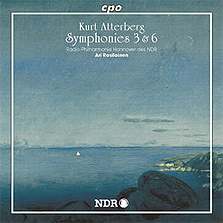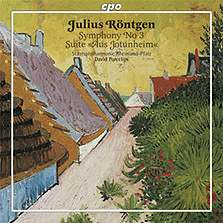|
Burkhard Schmilgun: Talking
to a musical treasure-hunter
by Ilja Nieuwland
 Photo:
Caroline Ranke Photo:
Caroline Ranke
Burkhard Schmilgun, Artists
& Repertoire Manager for cpo, likes
to talk; he is visibly at home in what
he describes as a ‘dream job’. The way
in which he landed it he calls ‘an
incredible collision of fate’: "I was
playing [as a violist, IN] in a recording
of Korngold’s orchestral works. Previously,
I’d written my MA thesis in musicology
on Korngold. cpo, then a young label,
was looking for someone to write the liner
notes, and the conductor suggested I do
it. That established our contact and after
my predecessor left in 1991, I was asked
to replace him"
Classic Productions Osnabrück
(cpo, in small print) occupies
surprisingly small premises: in addition
to Burkhard Schmilgun it houses three
people. But it is this small scale that
enables them to sustain an impressive
production speed. Among the smaller labels,
Osnabrück’s cpo has become a major
player. In 1986 it was founded as a daughter
company of the online culture store JPC.
Since then, it has released almost a thousand
CDs, often with world premiere recordings.
Nowadays, cpo also publishes audiobooks
and DVDs.
"I had always been
more interested in those ‘peripheral figures’
of music history. Not the olympic but
also very smooth Richard Strauss, but
rather Hans Pfitzner, who led a far more
interesting life. Why, if you’re looking
at present concert programmes, didn’t
he ‘make it’? Look at any older book about
music and you see a very different list
of major composers than we recognise nowadays.
If a musicologist in 1912 wrote enthusiastically
about Hausegger, Von Reznicek or Pfitzner,
why should he have been entirely mistaken?
Soon after joining cpo, I began collecting
material and soon, I’d amassed an enormous
repertoire - which I’m now trying to get
recorded."
Musicians aren’t exactly
known as the driving force between repertory
innovation. "That goes for about
ninety-nine percent. Anything unknown
is often treated as Pferdeleiche,
a horse’s corpse - something that you
can’t really perform anymore, something
utterly insignificant. But it is nonsense
to suppose that musical history has always
made fair judgments."
"Look at the operatic
repertory, for instance: that is frighteningly
narrow, especially once you realise what
is being performed regularly and set that
off against the huge mass of available
material. But if it’s too difficult or
not polished enough, it gets tossed aside
as a niche product. Take Busoni’s Dr
Faustus, for instance - a key work
in early 20th century opera: when is that
ever performed? These are operas with
their own aesthetic and musical language
- guiding works. Its neglect demonstrates
the overall rule of laziness. La Traviata
and Der Rosenkavalier will
sell themselves, after all.
A lot has been said about
the recent crisis of the recording industry,
with publicists such as Norman Lebrecht
annually hailing the last breath of classical
recording. Schmilgun won’t go that far,
but he is aware of the advantages of being
a small-scale operation: "As long
as this earth contains a few thousand
curious souls that are interested in what
took place next to Mahler, Mozart, or
Handel, we won’t experience a crisis.
Or as long as they wonder about local
musical heritage. In fact, the entire
classical recording industry has fallen
to the smaller, specialised labels: Chandos,
Hyperion, Capriccio, Sterling, and so
forth - and cpo, of course. And yes, the
former ‘majors’ such as Decca and EMI
are in the grip of crisis. Constructive
work is left to us, while they find another
attractive-looking violinist to do Mendelssohn
or Brahms. But in the area of repertoire
innovation we shouldn’t expect anything
any more: their organisations have grown
too big and it wouldn’t make economic
sense for them to undertake such small
projects. But for us, size is much less
important."
However, a lot of ignorance
must sometimes be overcome. "Ask
anyone to name a Dutch composer - they’re
not likely to come up with one. I could
say the same about Denmark, Serbia or
Turkey. Just about our entire classical
canon originates in the German-Austrian
countries: for Germans it isn’t deemed
necessary to look at other countries.
We can afford ourselves the luxury of
looking at Sibelius as though he were
a niche figure, whereas he is considered
a god in the UK. And Carl Nielsen is hardly
ever programmed; an insane situation.
Other Scandinavian repertory is completely
absent from German concert halls.
"Of course, I’m always curious to
see whether our editions have any impact
on concert programmes; that happens less
than I would have liked, though. On the
other hand, [music publisher] Breitkopf
and Härtel told me that our edition
of the Atterberg symphonies did lead to
more orders worldwide for sheet music
of his works. Particularly the third symphony,
a regular ‘pot-boiler’, is played more
often than it was. I make those enquiries
often, and it is clear that conductors
do decide to put a piece on their repertoire
on the strength of one of our CDs."
However, Schmilgun says
it has become easier to contract artists,
and to get reputed ensembles interested
in playing unknown repertoire. "Fortunately,
Simon Rattle has dusted out the Berlin
Philharmonic, who now play a much more
varied programme. But the big ‘battle
cruisers’ such as the Munich Symphony
Orchestra and the Bavarian Radio Orchestra
just play the standard repertory back
to back, mostly because of a somewhat
superior attitude - a ‘we don’t really
need that’ mentality. The fact that the
Royal Concertgebouw Orchestra recently
played Jan van Gilse’s Second Symphony
[in december 2006, IN] stands alone
as something of a revolution."
"Ours is an elite product,
obviously - it is consciously aimed at
niches, at a traditional, bildungsbürgerlich
raised audience. But there is an encouraging
amount of rejuvenation going on, and a
fairly large group of 18- to 40-year-olds
is interested in our releases - so we
don’t worry too much about our custom
‘dying out’ just yet. A lot is also sold
around concerts, where we are regularly
present - these customers are not so much
typical cpo customers but people that
become interested in the music or the
performers during the concert and purchase
the CD afterwards. "
"The overlap of CD buyers
and concert-goers is smaller than is usually
assumed. To give one example: a few years
ago, [violinist] Ulf Hoelscher played
Wolf-Ferrari’s concerto two evenings in
a row, which we’d recorded about ten years
earlier. After the concert these CDs could
be bought. On the first evening, two were
sold. I told Hoelscher on the second night:
why won’t you sit there and autograph
some of them? When he did, more than seventy
were sold. That is an interesting contrast:
two people were interested in the music
itself, but many more in the soloist.
Many CD-listeners rarely visit concerts
because they prefer to listen to music
in the tranquility of their living room."
Although reviews may
vary, everyone seems to be convinced about
the quality of cpo’s documentation. "From
the beginning, that was an important issue
for us. We consider ourselves to be pioneers:
when I reintroduce a composer to people
after a hundred years, I can’t very well
do so without supplying the best possible
text, particularly since they won’t be
able to find many names in modern works
of reference. The text ought to be on
the same level as the music. Often, they
are extensive ‘books’ and we pay particular
attention to whom we ask to write them.
We’d rather save on the cover or photography
than on the text."
However, Schmilgun admits
that control is by no means absolute:
"We decide on two points: what we
wish to record, and who is going to do
that. That is the creative part of my
job. If it goes wrong, it’s really my
rotten luck. But we naturally work with
people that have extensive experience
and that we know very well - there is
an extensive pool of suitable people.
Of course, it does not always work and
it does happen that I hear a recording
which has turned out differently than
I imagined. But that is also a subjective
matter."
cpo tries to work independently
from other, similar labels. Schmilgun:
"When I happen to hear that a certain
piece is being recorded, of course I don’t
do it myself. But I won’t conduct extensive
research: as long as the demand appears
to be there, we go with the project. You
have to have the courage to go your own
way. Our habit of recording a ‘new’ composer’s
complete work is also quite unique. For
instance, if we begin working on Atterberg
we don’t release one CD, but ten on the
trot. That is also a marketing ploy: if
I release just one CD, I guarantee that
no-one will be talking about Atterberg.
But if there are ten, some critics and
customers are bound to think: there must
be something special there.
When we talk about the
balance between historical interest and
musical quality, Schmilgun stays aloof:
"Both have to be present. Once a
composer has written a strong work, he
has proven himself. I don’t believe he
will descend to trash after that. And,
as I said, we deal in complete works.
I can’t very well say: we’re recording
four symphonies and number five just isn’t
good enough - that would smack of incredible
arrogance. Our public has to judge that
for itself."
For cpo, much new music
is problematic: "Classical music,
‘art music if you like’, has become an
intellectual exercise, not a hedonistic
pleasure in the lazy chair. The other
day, I heard a discussion about the influence
of birdsong on music, and all sorts of
bird songs were played - of an incredible
rhythmic and melodious diversity. But
is was all tonal - and that is exactly
the reason why so much atonal music doesn’t
connect with the public. We lack the internal
sensor to process something that someone
has put to paper and which may make mathematic
sense, but doesn’t reach you on an aesthetic
level. Understand me, some of it is very
interesting, but it can also be very impenetrable.
"
That doesn’t mean that
Schmilgun sees the solution with the ‘new
esoterics’ of composers such as Arvo Pärt
and Giya Kancheli: "I have some trouble
with that direction. On the one hand,
it is a reorientation on the greater public,
but it is also somewhat artificial. I
prefer sincerity that takes the risk to
offend its audience. Not that I doubt
the sincerity of Pärt and Kancheli,
but it is just not my world."
 Schmilgun
closes with his ambitions for the immediate
future: "Opera, to begin with: Pfitzner’s
Rose von Liebesgarten and a few
Reznicek operas. Then there is our Dutch
project headed by David Porcelijn: eight
CDs of music by Julius Röntgen have
already been recorded, and his massive
Aus Goethes Faust will be this
July. Then Jan van Gilse (symphonies and
the Opera Thijl), Henk Badings
and Willem Pijper." Schmilgun
closes with his ambitions for the immediate
future: "Opera, to begin with: Pfitzner’s
Rose von Liebesgarten and a few
Reznicek operas. Then there is our Dutch
project headed by David Porcelijn: eight
CDs of music by Julius Röntgen have
already been recorded, and his massive
Aus Goethes Faust will be this
July. Then Jan van Gilse (symphonies and
the Opera Thijl), Henk Badings
and Willem Pijper."
This interview originally
appeared in the online Dutch cultural
magazine 8WEEKLY (www.8weekly.nl).
Julius Röntgen’s
Aus Goethes Faust can be heard
in the Muziekcentrum Enschede on 21 June
2007, and is performed by the Eastern
Dutch Orchestra and the National Travel
Opera. Conductor is David Porcelijn
|












